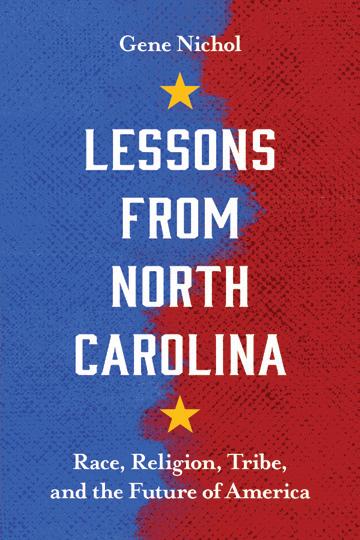
4 minute read
Republican Takeover
UNC-Chapel Hill law professor Gene Nichol’s new book on recent North Carolina politics is an indictment of the Republican agenda. It also doesn’t forget the Democrats’ inability to stop it.
BY JASMINE GALLUP arts@indyweek.com
North Carolinians will find many of the events described in Gene Nichol’s new book—Lessons from North Carolina: Race, Religion, Tribe, and the Future of America—horrifyingly familiar.


Anyone living in the state during the 2010s will remember Republicans’ unprecedented attacks on voting rights during Barack Obama’s tenure; the battle over House Bill 2; and the GOP’s crippling cuts to the state’s unemployment compensation program. Nichol, a UNC-Chapel Hill law professor, places these events in a unique context, arguing that they foreshadowed the decline of democratic principles we’re seeing in the United States today. He also highlights lesser-known legislation, revealing a worrying pattern of injustice perpetuated by the state’s Republican Party.
North Carolina’s turn away from a liberal (or even moderate) agenda in 2012, when Republicans captured all three branches of government, may be a done deal at this point, but it’s worth looking back at how we got here. More important, it’s worth looking at the way we now see the deceptive, mightover-right politics of North Carolina’s Republican Party play out on the national stage.
It’s tempting to think that North Carolina isn’t the worst offender. With the kind of antiLGBTQ and outright racist legislation promoted by Republican governor Ron DeSantis, it’s easy to point the finger at states like Florida—or Texas, where a federal judge is trying to ban medication abortion nationwide.
But in 2010, as now, North Carolina was home to a bullish Republican Party that made a national pastime of trampling rights to stay in power—not only through partisan and racial gerrymandering but through restrictive voting laws, partisan judicial decisions, and undue influence over public universities (namely UNC).
As Nichol puts it: “I’m not certain most North Carolinians recognize their democracy is seriously imperiled. Most are reluctant to conclude that an array of their leaders is out to end the American political experiment.”
Nichol argues that the misleading rhetoric of North Carolina’s Republican establishment (the likes of house speaker Tim Moore and senate leader Phil Berger) is just as dangerous, if not more so, than the outright insurrection of Donald Trump and his supporters. North Carolina Republicans may hide behind claims of “voter fraud” or “states’ rights,” but ultimately they’re working for their own supremacy above others, in a kind of identity politics not often associated with the Republican Party, he writes.
“Many of our leaders … [are] placing tribe over democracy and power over constitutive principle,” Nichol writes. “[Saying that] some of us are full members, the real tribe, the full Americans, the owners, while others may be allowed to enter or to remain but are viewed more like tenants.”
Nichol points to an array of examples, jumping from one legislative misstep to the next to demonstrate how the Republican Party is testing the unwritten rules of democracy, as well as the concept of “truth,” in ways that are widespread today.
Nichol’s narrative can feel a bit scattered at times, but he cuts through the murky, confusing world of North Carolina politics with incisive observations about the real effect of Republican policies over the last decade. He takes aim at Republicans and some of their most ardent supporters (radical Christian evangelicals) by speaking in their voice, exposing their true motives as well as the hypocrisy inherent in rubbing shoulders with white supremacists and those protesting abortions while paying for them.
The most interesting chapter is undoubtedly the one in which Nichol gives his firsthand account of how the Republican-dominated legislature interfered (and continues to interfere) with the UNC system, likely permanently crippling what was once known as the best public university in the country. This 20-page “Destroying a Priceless Gem” chapter sheds new light on widely reported events at UNC, giving readers an inside look at the closure of Nichol’s Center on Poverty, Work and Opportunity; attacks on UNC Press; and decisions on Nikole Hannah-Jones’s tenure.
Republicans aren’t the only object of critique in Nichol’s book, however. The law professor also criticizes Democrats, calling them out on their unwillingness to speak candidly about Republicans’ attacks on LGBTQ people, Black residents, and other minority communities.
“There is a notable chasm between Democratic politics and movement politics,” Nichol notes. “While much of North Carolina— me included—believes that the very meaning and character of the commonwealth is urgently imperiled, its legislative representatives, the minority party included, often don’t seem to act as if that is the case.”
Democrats wonder why people in their districts aren’t turning out to support them, all while taking moderate, defensive posi- tions; worrying about giving offense; and holding fast to the phrase “Republicans will be worse,” as if that’s an inspiring call to action, Nichol argues.
His poignant example of the support that flooded in for Michigan Democratic lawmaker Mallory McMorrow following a blunt speech she gave about fighting hate in 2022 demonstrates that people will respond to courageous truth-telling. It’s hard not to wonder how the Democratic Party has not yet learned that lesson.
Still, Nichol does leave us with some hope for America’s future, namely through stories of grassroots activists. His recollection of the Moral Monday protests led by figures such as Rev. William Barber II and lifelong civil rights activist Rosanell Eaton shows the power of collective action by ordinary citizens.
Underrepresented people could have a truly powerful effect in creating change if they focused on their commonalities instead of their differences, Nichol writes. Together, we must be the “guarantors,” not just the “heirs,” of freedom.
“We can’t claim only liberty’s gift without also assuming its obligation,” Nichol concludes. “We’ve come to understand, even if reluctantly, that democracy is never a final achievement; it is a call to an unending struggle …. Most crucially, we utterly refuse to give up on the notion of an America for all, even when it hangs frighteningly in the balance—especially when it hangs frighteningly in the balance.” W










